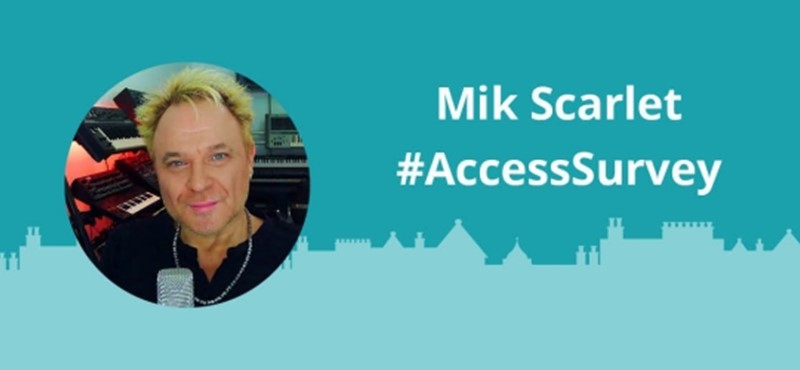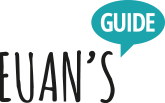Access Survey Insights - Mik Scarlet

We hear from Mik Scarlet, Broadcaster and Journalist on his thoughts about the impact of Covid on disabled access and more! The 2021 Euan’s Guide Access Survey supported by Motability Operations ran in Autumn 2021 with results published in March 2022. Over 2400 disabled people and their friends, families and carers took part.
Do you think disabled access has got better or worse since Covid started?
When the Covid lockdowns started I truly thought that an unspoken outcome would be the wider non-disabled society might gain a deeper insight into what it means to be disabled. The lack of autonomy that lockdown inflicted on us all is a major element of the lived experience of disabled people. We spend out lives facing choices that are lessened and limited by external forces and having to live with this. With the whole of our society suddenly facing the same lack of choice I saw it as a learning experience for us all. Sadly this is not what happened. Instead disabled people have seen the value of their lives lessened. How often have you heard “most of the people who died had underlying health conditions” as if that was OK? When it comes to physical access, as always it’s really the external effect of attitudes, and the Covid crisis seems to have actually hardened the way society thinks about disabled people. Before there was a growing feeling that the right to access is something disabled people should expect and be given. Since it’s returned to being seen as something too difficult of expensive for society to be expected to deliver. Worse than that, elements of access that were in place have been removed in the name is social distancing and the benefit of the wider, non-disabled community. We’ve become acceptable losses at every turn. I see a society coming out of Covid and know we are going to have re-fight so many battles we thought we had already won.
What is the impact of local traffic changes such as spaces for people and low emission zones?
This is one of the major areas where disabled people have been forgotten and ignored. I am outspoken on these issues because I live in an area where a Low Traffic neighbourhood was installed and have felt the negative impacts personally. The ability to not enact the legal requirements of the Equality Act that were brought in with the Coronavirus Bill led to a gold rush to implement schemes to cut traffic that were poorly thought through and have almost entirely left out the requirement for accessibility and inclusive design. Every council has a Public Sector Equality Duty to ensure that all of their policies do not disadvantage any protected group, yet at every turn the schemes to cut traffic and promote walking and cycling make the lives of disabled people harder. They lead to disabled people not being to live as independently as before Covid. Even the idea of Streateries, outside dining spaces, has been implemented by taking Blue Badge Bays out of action. Worse than the impact of these schemes is the total lack of engagement after. All over the UK we are seeing disabled people’s voices being ignored. As it became clear that these schemes were not inclusive, disabled people spoke out. Not wanting to do away with the idea of cutting traffic or making out towns and cities greener healthier place, but trying not to do it at the cost of our ability to live in society equally. Our voices have not only been ignored but we are being painted as radical supporters of some imagined car lobby. Many of us can only use cars. Whether we drive, are driven or use taxis, a car can be the only way of getting around for many. Even when councils are rolling out exemptions, they aren’t really inclusive. Disabled people are yet again seen as acceptable losses in the drive to make our cities greener.
Will / when will disabled people gain / regain confidence to visit arts venues?
I don’t think that arts venues are the worst culprits. They have been mostly closed and have led the move into the world of remote experience. The arts world has embraced the online experience and this has opened up the arts to many disabled people who could never engage before. The problem is the wider society. The issue of getting into towns and cities explored above mean that even those who used to love going to arts venues are finding their wishes to return to “normal” are difficult or impossible. I have worked with many arts venues during lockdown on creating safe inclusive ways of remaining safe as they reopen and I would say the commitment should be mirrored by the wider society.
What do you feel has been the most positive thing in the past year also for disabled people?
The huge growth in the sense of community. I’ve been struck at how much the online world has opened up a national and global disabled community to so many of us. This has led to a growing sense that we can make change, as the more of us that are in contact, the louder our voices are. I’ve seen people from all over supporting each other and sharing knowledge and experience. I hope this will continue and we might see the beginning of a global disabled community that pushes for true inclusion for all wherever they might live.
Mik Scarlet is a Broadcaster and Journalist. You can follow them on Twitter @MikScarlet
For full results of the Euan's Guide Access Survey supported by Motability Operations, please visit www.EuansGuide.com/AccessSurvey


 Follow Euan's Guide on Instagram
Follow Euan's Guide on Instagram
 Follow Euan's Guide on LinkedIn
Follow Euan's Guide on LinkedIn
 Follow Euan's Guide on Facebook
Follow Euan's Guide on Facebook


Comments
You have to be signed in to leave a comment.
Login / Signup